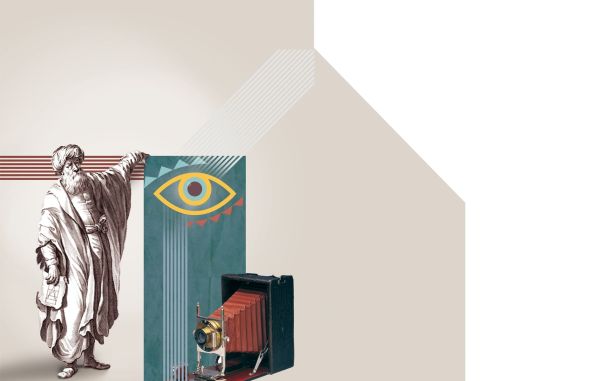The Qur’an Made Me a Scientist

In This Article
-
Many of my friends ask me how I can deal with the two conflicting worldviews (religion and science) and whether one of them negatively influences the other. I tell them, to the contrary, my religion asks one to be a scientist.
-
The steps of the empirical cycle can be clearly traced in the Qur’ Many verses order us to observe the universe. Once gathering our observations and data together, God suggests us to examine all the statements and follow the best one.
-
While reading the Qur’an to learn about worship and spirituality, I realized that God requires all believers to examine the universe, from the smallest to the largest creatures, by applying a systematic empirical method of investigation.
I am a cognitive neuroscientist experimenting on human cognition while learning and using language. In short, I am a psycholinguist. I am also a religious person who believes and follows Islamic tradition. Many of my friends ask me how I can deal with the two conflicting worldviews and whether one of them negatively influences the other. I tell them, to the contrary, my religion asks one to be a scientist and examine the universe in every aspect. I would even argue that God expects all humans to be scientists.
For epistemic inquiries and gathering knowledge, religions are believed to follow only holy revelations while science follows empirical investigations. Thus, religions and science have long been considered contradictory. Religious people are commonly considered mindless blind devotees who believe and apply whatever is told to them by divine revelation. On the other hand, scientists are seen as mindful investigators who test and experiment their knowledge before accepting and applying it.
History records quite a high number of religious individuals who have also been pioneers in different scientific fields. The main purpose of this article is not to list all these names, but to discuss the standpoint of God towards scientific research methods for building a body of knowledge about the universe from the Islamic perspective. I will be describing the main principles of the scientific method to reach the truest knowledge, vis-à-vis principles stipulated by God as mentioned in various Qur’anic verses.
Empirical investigation
For scientists, the method of finding true knowledge is empirical investigations. The term “empirical” originated from ancient Greek medical practitioners who refused to use the dogmatic doctrines. Instead, they preferred to rely on their observations and experiences. Empirical investigations in science are known as knowledge collection methods. They only rely on observable and testable data gathered by senses followed by arriving at mindful conclusions based on the collected data. In the same vein, one of the first orders of God in the Qur’an is to avoid dogmatic and untested knowledge and presumptions, as is seen in the following verses:
“…they respond: ‘No, but we follow that (the traditions, customs, beliefs, and practices) which we found our forefathers in.’ What, even if their forefathers had no understanding of anything, and were not rightly guided?” (2:170) [1]
“They have no knowledge of this. They follow nothing other than conjecture, and conjecture can never substitute for anything of the truth.” (53:28) [2]
The Qur’an also strongly emphasizes the importance of gaining and gathering knowledge:
“[always] say: ‘My Lord, increase me in knowledge!’” (20:114)
“Say: ‘Are they ever equal, those who know and those who do not know?’ Only the people of discernment will reflect and be mindful!” (39:9).
Furthermore, the Qur’an orders believers to use the mind and senses to gather knowledge and arrive at a conclusion:
“They have hearts with which they do not seek the essence of matters to grasp the truth, and they have eyes with which they do not see, and they have ears with which they do not hear. They are like cattle—rather, even more astray. Those are the unmindful and heedless!” (7: 179) [3]
“Indeed the worst kind of all living creatures in God’s sight are the deaf and dumb, who do not reason and understand.” (8:22)
Even more specifically God asks us to direct our attention towards the sky and earth (3:190-191, 10:101, 15:16, 30:50, 45:13, 50:6, 88:18, 88:20), stars (37:88), the alternation of night and day (23:80), the origin of creation (29:20), the history / stories of the past (3:137, 6:11, 16:36, 27:69, 30:9, 30:42, 35:44, 40:21, 47:10), the sources of food/nutrition (80:24), the material of creation (86:5), clouds pregnant with water, camels, (88:17), mountains (88:19), and ripening fruit (6:99) as some of the examples to observe and examine. He frequently reminds us to use our reason and mind (“Will you not, then, use your reason?” (28:60)) [4] and suggests that we need to come up with empirical evidence to support our hypothesis (“Produce your proof if you are truthful (in and convinced of your claim)!” (2:111)). Thus, producing knowledge by empirical investigations is what God suggests or even orders. As the next step, let us understand the empirical cycle.
Empirical cycle
The empirical research cycle was suggested by A. D. de Groot. This cycle consists of five equally important phases.
1) Observation: Observation is the first step to start a scientific inquiry. When scientists come up with a research idea, they propose a hypothesis, an educated guess. During this step, data is collected through observation.
2) Induction: Inductive reasoning is then applied to the data of many observations to form a general conclusion. This general statement is used to summarize a general law that can explain various observations.
3) Deduction: This step helps scientists to create different hypotheses related to the first idea based on the previously accepted law. These additional hypotheses are stated based on logic and rationality.
4) Testing: This step is to return to empirical methods to the stated hypotheses created in the deduction phase. Scientists collect new data and use statistical analysis to test whether the new observations support the hypothesis.
5) Evaluation: This step requires a detailed evaluation about the findings. Scientists need to put forth their data, the supported hypothesis, and their conclusion. They need to discuss the limitations of the testing process and alternative explanations for the findings. At this step, one of the most important rules that every scientist must follow is parsimony, aka Occam’s razor. This rule states that among all possible explanations of the truth, the simplest one should be accepted.
As the cycle continues the findings are replicated and retested numerous times and turned into robust findings or generally accepted facts. When most facts are discovered, they establish theories which are the laws that explain the complex formations of the universe.
The steps of the empirical cycle can be clearly traced in the Qur’an. I already discussed the verses that order us to use our eyes and to observe the universe in the previous section. Once gathering our observations and data together, God suggests us to examine all the statements and follow the best one: “Who, when they hear speech, follow the best of it (in the best way possible, and even seek what is better and straighter). Those are the ones whom God has guided, and those are the ones who are people of discernment.” (39:18). This verse suggests we use inductive reasoning as examining all possible explanations and induce the best explanation.
Out of the best explanation, we need to deduce individual hypotheses using logical and rational thinking. As mentioned above (also see footnote 4), the Qur’an frequently asks us to use our reason and mind (“Will you not, then, use your reason? (28:60)) to apply deductive reasoning.
The next step is hypothesis testing. The Qur’an provides us a great example of how hypothesis testing works in the verses about Joseph and the woman (the master’s wife):
“And the woman in whose house he was living sought to enjoy herself by him. She bolted the doors and said, ‘Come, please!’ He said: ‘God forbid! My lord (your husband) has given me honorable, good lodging. Assuredly, wrongdoers never prosper.’ (12:23)
“So they raced to the door, and she tore his shirt from the back, and they met her master (husband) by the door. She cried: ‘What should be the recompense for him who purposes evil against your household—except imprisonment or a grievous punishment?’
“He (Joseph) said: ‘She it was who sought to enjoy herself by me.’ And one of those present, a member of her household, said: ‘If his shirt has been torn from the front, she is telling the truth, and he is a liar. But if it is torn from the back, then she is lying, and he is truthful.’ So when he (her husband) saw that his shirt was torn from the back, he (turned to his wife and) said: ‘This is from the guile of you women; for sure your guile is great.’” (12: 25-28).
In short, party 1 (the woman) accuses party 2 (Joseph) of wishing to do harm/evil to her, and party 2 denies this. This story suggests we deduce a logical, reasonable, and testable hypothesis to arrive at a conclusion. This hypothesis is of the format “if A is X then B is Y” which uses the observable to decide the unobservable. It is very important to note here that the expert witness has stated the two hypotheses as the decision rule and the judgment criteria, prior to seeing the shirt; thus, the conclusion will be objective.
The last step in the cycle is evaluation—ordered in the Quran as self-evaluation: “Read your book! Your own self suffices you this day as a reckoner against you!” (17:14). As a scientist we have to evaluate our results, criticize ourselves and declare our limitations during the investigation (“And do not conceal what you have witnessed” (2:283)). In this evaluation process, for the sake of parsimony, if the results allow more than one explanation, we need to choose the simplest one, as is also stated by God: “God does not will to impose any hardship upon you, but wills to purify you” (5:6); and “God wills ease for you, and He does not will hardship for you” (2:185).
Once we gather knowledge, before and/or after announcing (publishing) it, we have to replicate the findings. We need to make sure that the same situation in the same environment consistently reveals the same results. We are also warned by God to verify the truth before giving credence to any reports: “If some transgressor brings you news (that requires taking action), verify it carefully (before you believe and act upon it)” (49:6); “Do not follow that of which you have no knowledge (whether it is good or bad), and refrain from groundless assertions and conjectures. Surely the hearing, the sight, and the heart—each of these is subject to questioning about it” (17:36).
When our results turn to robust findings that are largely accepted, then we use inductive reasoning again to figure out the broader explanations of findings like ours. This process is the theory-building process which often leads us to discover the laws of the universe. This is the ultimate goal for all scientists and individuals who follow God’s order: “Surely, We have created each and every thing by (precise) measure” (54:49); “He who creates everything and determines its nature in accordance with a design (25:2)”; and “…who creates [everything], and thereupon forms it in accordance with what it is meant to be, and who determines the nature [of all that exists], and thereupon guides it [towards its fulfillment]” (87: 2-3).
Ethics in empirical investigations
As a psycholinguist who conducts experiments on human beings, ethical procedures are equally important, ensuring we follow the rules and regulations of the empirical cycle. The history of psychological research is full of examples that violate ethical principles and the rights of subjects. Thus, in 1979, the Belmont Report was published as a regulation for the rights of human subjects. It defined the three ethical principles that now guide studies with human subjects in the U.S.
1) Respect for persons: “Respect for persons incorporates at least two ethical convictions: first, that individuals should be treated as autonomous agents, and second, that persons with diminished autonomy are entitled to protection.”
2) Beneficence: “Two general rules have been formulated as complementary expressions of beneficent actions in this sense: (1) do not harm and (2) maximize possible benefits and minimize possible harms.”
3) Justice: “An injustice occurs when some benefit to which a person is entitled is denied without good reason or when some burden is imposed unduly...”
God ordered us to follow these ethical principles centuries ago:
1) Respect for persons: “Assuredly We have honored the children of Adam.” (17:70)
2) Beneficence: “…do not ruin yourselves by your own hands, do it in the best way in the awareness that God sees it. Surely God loves those who are devoted to doing good.” (2:195)
3) Justice: “…blame attaches but to those who oppress [other] people and behave outrageously on earth, offending against all right: for them there is grievous suffering in store!” (42:42)
Conclusion
While reading the Qur’an to learn about worship and spirituality, I also realized that God requires all believers to become scientists and to examine the universe, from the smallest to the largest creatures, by applying a systematic empirical method of investigation. Thus, there is nothing contradictory between science and religion. By saying this, I do not mean that every believer should be in a lab and experiment on physics, chemistry, genetics, or psychology. Instead, believers should follow the empirical investigation method, whether at work, while cooking, fixing a car, dealing with friends, raising kids, exercising at the gym, shopping, and so on. It is the lifestyle that God suggests to us as the best.
Notes
- All cited Qur’an verses are taken from the Qur’an by Ali Unal.
- For similar verses: 10: 78, 43: 22-23, 7:28, 6:116, 6:148, 10:36, 10:66, 45:24
- For similar verses: 25:44
- The verses that suggest using one’s reason: 2:164, 2:242, 3:118, 5:58, 6:83, 6:151, 7:169, 8:22, 10:42, 10:100, 21:67, 28:60, 29:35, 30:24, 30:28, 36:62, 37:138, 40:67, 49:4
Figure 1. This figure depicts the empirical research cycle by de Groot.









